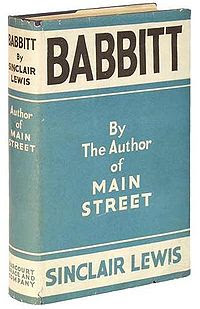I am deep into my Midwestern odyssey right about now, so in my absence, I thought I'd provide you with a few of my favorite socially conscious Middle American novels.
 I read "Babbit" ages ago and still can't get its hapless protagonist out of my head. Everyone has a Babbit in their lives; he's that annoying combination of ignorance and optimism, the guy who always follows the herd but remains convinced he leads the pack. Funny thing is, you can't help but sympathize with the schmuck. He's an archetypal character, most recently revived (I think) by Ricky Gervais in "The Office." A midlife crisis forces Babbit to confront the pressures of provincial fervor, conformism and materialism head-on, resulting in a personal awakening...or not.
I read "Babbit" ages ago and still can't get its hapless protagonist out of my head. Everyone has a Babbit in their lives; he's that annoying combination of ignorance and optimism, the guy who always follows the herd but remains convinced he leads the pack. Funny thing is, you can't help but sympathize with the schmuck. He's an archetypal character, most recently revived (I think) by Ricky Gervais in "The Office." A midlife crisis forces Babbit to confront the pressures of provincial fervor, conformism and materialism head-on, resulting in a personal awakening...or not.



1. Babbit (1922) by Sinclair Lewis
 I read "Babbit" ages ago and still can't get its hapless protagonist out of my head. Everyone has a Babbit in their lives; he's that annoying combination of ignorance and optimism, the guy who always follows the herd but remains convinced he leads the pack. Funny thing is, you can't help but sympathize with the schmuck. He's an archetypal character, most recently revived (I think) by Ricky Gervais in "The Office." A midlife crisis forces Babbit to confront the pressures of provincial fervor, conformism and materialism head-on, resulting in a personal awakening...or not.
I read "Babbit" ages ago and still can't get its hapless protagonist out of my head. Everyone has a Babbit in their lives; he's that annoying combination of ignorance and optimism, the guy who always follows the herd but remains convinced he leads the pack. Funny thing is, you can't help but sympathize with the schmuck. He's an archetypal character, most recently revived (I think) by Ricky Gervais in "The Office." A midlife crisis forces Babbit to confront the pressures of provincial fervor, conformism and materialism head-on, resulting in a personal awakening...or not. 2. The Magnificent Ambersons (1918) by Booth Tarkington

At its heart, a tale of a prominent Midwestern family in decline, it offers a perspective on the rapid industrial rise of America as seen through the eyes of George Amberson Minafer, a selfish, spoiled heir who is unable -- or unwilling -- to face progress. Yes, the movie is a masterpiece, but I think the book is just as satisfying.
3. Jennie Gerhardt (1911) by Theodore Dreiser

Jennie's life resonated with me; at the time I read this book, I had just moved to Manhattan after college and was working at an ad agency and supporting myself for the first time. I remember feeling anguished over her tragic circumstances and the unfairness of what life was like for a girl my age a mere 80 years earlier.
4. An American Tragedy (1925) by Theodore Dreiser

So much has been written about this book and I'll just say this: it changed me. Clyde Griffiths is like every American: he wants the girl, the money and the lifestyle to go with it. Unfortunately, he lives in a society that is prejudiced, insular and unfair, making it next to impossible for him to achieve these goals. By the time he commits his great crime, you almost forgive him for it, knowing the struggles and tragedies of his life as intimately as you do.
Note on Dreiser:
I know some people are anti-Dreiser because they feel his prose is clunky and mechanical. He has been called "one of the worst greatest writers in America." To me, however, you don't read Dreiser for the prose, you read him because his unerring journalist's eye gives you a searing glimpse into the dark side of human nature at the turn of the 20th century.